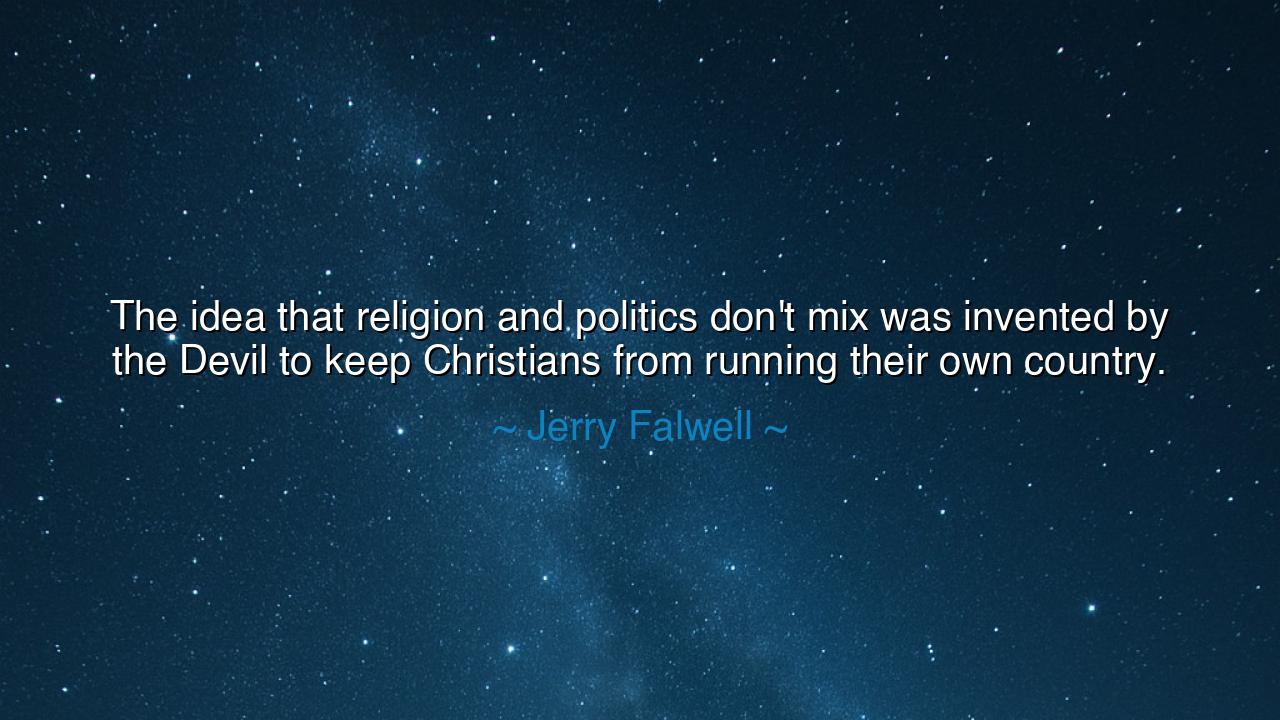
The idea that religion and politics don't mix was invented by the
The idea that religion and politics don't mix was invented by the Devil to keep Christians from running their own country.






"The idea that religion and politics don't mix was invented by the Devil to keep Christians from running their own country." – Jerry Falwell.
In these words, Jerry Falwell boldly asserts that the separation of religion and politics is not a principle born of reason or wisdom, but a deceptive strategy employed by the forces of evil to hinder the true power of the faithful. Falwell suggests that the notion of a clear divide between religious life and political life was deliberately designed to weaken the influence of Christianity in the affairs of the state, to prevent believers from asserting their moral authority over the laws of the land. In his view, this separation is not neutral, but a sinister plot meant to suppress the influence of righteousness in the governing of nations.
Throughout history, religion and politics have been intricately intertwined, and the great leaders of the past understood the profound importance of aligning the state with divine principles. Emperor Constantine, for example, recognized the power of Christianity as a unifying force and made it the official religion of the Roman Empire. His decision was not simply a political move, but an acknowledgment of the moral order and truth that Christianity offered. By intertwining religion with governance, Constantine sought to create a society grounded in the values of justice, compassion, and peace—values that he believed were divinely ordained.
The ancient kings and rulers of Israel, such as King David and King Solomon, also understood that their authority was granted by God, and thus their role was to govern in accordance with divine law. The Torah was not merely a religious text but a guidebook for governing society. The fusion of religious and political life was seen as the means by which the moral fabric of society could be preserved and strengthened. In this light, Falwell’s words echo the wisdom of ancient rulers who saw no contradiction between being both a spiritual leader and a political authority. For them, to govern well was to govern according to the will of God.
However, the idea of separating religion and politics has its roots in more recent times, arising from the growth of secularism and the spread of the Enlightenment ideals that sought to distance the state from religious influence. This idea was enshrined in Western political thought with the establishment of constitutional democracies that sought to ensure freedom of belief and the protection of individuals from religious imposition. The notion that religion should not influence political decision-making is foundational to the American Constitution, where the First Amendment guarantees freedom of religion and prevents the establishment of a state religion.
Yet, Falwell’s words challenge this separation, asserting that such a divide is not natural but rather a manipulative device that weakens the moral authority of Christianity in the governance of the state. To him, a Christian nation is one that aligns its laws and policies with Christian teachings and values, ensuring that the truth of God’s word shapes every facet of governance. In this view, the moral guidance of religion is seen as indispensable in the crafting of just and righteous laws, a belief that harkens back to the Divine Right of Kings, where monarchs ruled with the authority believed to come directly from God.
Consider the example of Martin Luther King Jr., a figure whose leadership blended religious conviction with political activism in the pursuit of civil rights. King did not see a conflict between his faith and his fight for justice. He believed that the teachings of Christianity—particularly the command to love one’s neighbor and to fight for justice—were integral to shaping the moral foundation of the laws of the land. His movement was deeply rooted in his understanding of God's will, and his political actions were driven by the belief that a moral society must reflect divine principles. Through his example, we see the potential for religion to inform political action in the pursuit of justice, compassion, and the common good.
The lesson that Falwell’s words offer is one of activism—a call to engage with the political world not as passive observers but as agents of change grounded in faith and moral conviction. To separate religion from politics may, in Falwell’s view, be to turn away from the moral compass that guides a just society. If we believe that our faith has the power to shape the world for good, then we are called to engage actively in the shaping of laws and policies, ensuring that they reflect the values of compassion, justice, and righteousness.
In our own lives, we must examine the role that religion plays in shaping our views on governance and society. While we may not agree with the exact model of governance that Falwell proposes, we must ask ourselves how our moral beliefs can shape our actions in the political realm. Justice, peace, and compassion—values central to most faiths—should guide us as we navigate the complex world of politics, working to ensure that the laws we create reflect the higher principles of human dignity and love.






AAdministratorAdministrator
Welcome, honored guests. Please leave a comment, we will respond soon